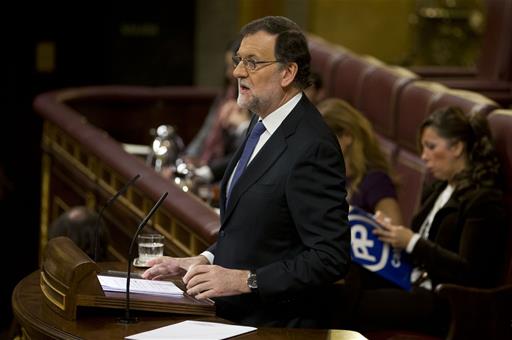Extraordinary plenary session of Lower House of Parliament
Mariano Rajoy says Spain is ready to respond to refugee challenge
President's News - 2016.4.6
Lower House of Parliament , Madrid
Mariano Rajoy explained that the European Council meeting held in Brussels on 18 and 19 February agreed the new position for the United Kingdom in the European Union. He said that "these negotiations were based on a shared wish for the United Kingdom to remain a member of the European Union", while preserving "the principles, values and objectives" of the EU.
Following some "intense negotiations" between the EU and the United Kingdom, an agreement was finally reached in four areas: economic governance, competitiveness, sovereignty and social benefits and free movement.
EU-United Kingdom Agreement: economic governance and competitiveness
As regards economic governance, Mariano Rajoy said the agreement established "a safeguard to avoid the possible discrimination of individuals or legal entities within the EU based on the currency of a Member State" and, furthermore, included "a guarantee that taxpayers from Member States that do not use the Euro will not be liable for operations aimed at supporting the single currency".
In the field of competitiveness, the President of the Government explained the importance given to the need to "build a more competitive EU in pursuit of growth and job creation", further developing the internal market and broad trade agreements.
Sovereignty and free movement
The President of the Government explained that the third point of the agreement - on so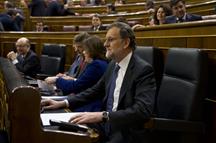 Pool Moncloa/Diego Crespovereignty - "led to greater debate" in order to avoid "renouncing the essence of the European project" - "an increasingly stronger union between the peoples of Europe". In the end, it was recognised that the United Kingdom "is not committed to greater political integration into the EU".
Pool Moncloa/Diego Crespovereignty - "led to greater debate" in order to avoid "renouncing the essence of the European project" - "an increasingly stronger union between the peoples of Europe". In the end, it was recognised that the United Kingdom "is not committed to greater political integration into the EU".
However, Mariano Rajoy said that the most controversial point of the agreement related to social benefits and free movement, as this represented one of the main concerns for the UK and Europe. He explained that an agreement on limits to social benefits for non-British workers was possible "after introducing certain guarantees", such as time limits, no retroactive application and an exclusive restriction to non-contributory benefits.
Furthermore, the President of the Government said that the number of Spanish workers who will be affected by this agreement with the United Kingdom will be "very low" because it will only affect "new workers joining the labour market and because the social benefits in question are exclusively care-related, and non-contributory".
EU-Turkey Summit
The President of the Government explained that the EU-Turkey Summit held on 18 March was preceded by a prior meeting on 7 March, at which the President of the European Council, Donald Tusk, was charged with working on and finalising the proposal that had been presented by the Turkish Prime Minister with regard to the migrant crisis.
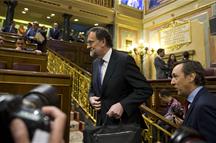 Pool Moncloa/Diego CrespoBefore specifically referring to the agreement on refugees, the President of the Government clarified two issues: that Turkish citizens wishing to enter Schengen territory will obtain a visa provided they meet the requirements; and that the negotiations on accession by Turkey to the EU require compliance with the so-called "Copenhagen criteria" and respect for human rights and fundamental freedoms.
Pool Moncloa/Diego CrespoBefore specifically referring to the agreement on refugees, the President of the Government clarified two issues: that Turkish citizens wishing to enter Schengen territory will obtain a visa provided they meet the requirements; and that the negotiations on accession by Turkey to the EU require compliance with the so-called "Copenhagen criteria" and respect for human rights and fundamental freedoms.
Mariano Rajoy listed the main points of the agreement between the EU and Turkey:
- As from 20 March 2016, those illegal immigrants arriving to the Greek islands through Turkey will be returned to this country "on a temporary and extraordinary basis" and always "in full compliance with international and EU law".
- For each Syrian returned to Turkey, another Syrian citizen will be resettled from Turkey to the EU while taking into account the United Nations vulnerability criteria.
- Turkey is committed to avoiding new illegal migration routes by sea or land opening up to the EU.
- A voluntary regime of humanitarian admission will be launched.
- The deregulation of visas will be expedited in order to eliminate the requirements imposed on Turkish citizens wishing to enter Schengen territory.
- The EU will disburse the three billion euros allocated "by virtue of the financial facility for Turkey". When these resources have been entirely exhausted, and provided that the afore-mentioned requirements have been met, the EU "will mobilise an additional three billion euros up to the end of 2018".
The Lower House of Parliament mandate was followed
The President of the Government explained that this agreement is "fundamentally" aimed 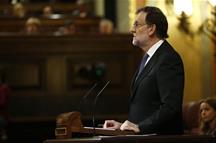 Pool Moncloa/Diego Crespoat "avoiding the loss of human life, dissuading those who expose their physical integrity and life to trips of a very dangerous nature". It is also aimed at combating human trafficking mafias and offering a legal channel to those "entitled to international protection".
Pool Moncloa/Diego Crespoat "avoiding the loss of human life, dissuading those who expose their physical integrity and life to trips of a very dangerous nature". It is also aimed at combating human trafficking mafias and offering a legal channel to those "entitled to international protection".
Mariano Rajoy stressed that, throughout the negotiation process, Spain always advocated "strict respect for European and international law, and express exclusion of any form of mass expulsion; the individualised processing of asylum applications; and special attention for the most vulnerable people". In other words, "this government followed the mandate contained in the Institutional Declaration approved by all parliamentary groups on 16 March" given that the guarantees demanded were introduced into the agreement.
European Council agreements in March
Besides the summit held with Turkey, the European Council met on 17 and 18 March to discuss other fundamental migration issues, such as increasing surveillance of so-called hotspots (necessary for recording and identifying asylum applicants) and providing Greece with the necessary means to meet the agreement with Turkey and "improve the situation being suffered by refugees".
In this regard, he recalled that Spain experienced a similar situation in 2006 when over 36,000 people illegally arrived by sea "from West Africa to the Canary Islands". At that time, the crisis was tackled satisfactorily thanks to the adoption of "measures based on cooperation with the countries of origin and transit, including active involvement". He went on to add that "this was undertaken by the previous government but, as is the case for any State policy, it was maintained by the current government".
Spanish experience
The President of the Government said that Spain's European partners highly valued this Spanish experience, meaning that Spanish experts will be assigned to "EASO and FRONTEX" for action in the hotspots in Sicily and L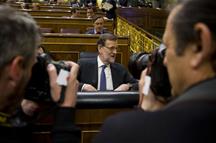 Pool Moncloa/Diego Crespoampedusa (Italy).
Pool Moncloa/Diego Crespoampedusa (Italy).
Mariano Rajoy stressed that, "if there is one country that is ready to respond to the migration challenge", that country is Spain because "that is the will and the desire of the Spanish people" and "that will always be the focus for efforts by Spain's government".
As regards the relocation and resettlement of refugees, the President of the Government said that "we are acting with responsibility and solidarity". Although the process has been launched "infuriatingly slowly", it has been speeding up "in recent weeks". He stressed that Spain is "among the first countries to show a willingness to relocate refugees".
Economic measures
The European Council meeting held in March also agreed on a number of economic measures. In this regard, Mariano Rajoy said that the priorities continue to be the promotion of investment, structural reforms and fiscal consolidation compatible with growth.
As regards the matters affecting Spain, the European institutions acknowledged "the efforts made by Spain" and recognised "the change in trend in the Spanish economy". Nonetheless, they warned that "the main risk is a deceleration in the reform agenda" because these are still needed "to strengthen the competitiveness of our sectors".
Finally, the President of the Government, Mariano Rajoy, explained that the debate "on reforming the Economic and Monetary Union and further developing the single market" remains "strategic". He added that Spain's position in this regard has always been "ambitious", consistently advocating greater economic, financial and fiscal integration. "This means a fiscal union with a European budget and the ability to apply stabilisation and economic promotion policies whenever necessary", he concluded.
Europe, a story of success
Following speeches by the various parliamentary groups, Mariano Rajoy expressed "very negative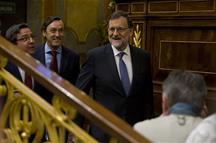 Pool Moncloa/Diego Crespo" surprise in response to the statements from a number of spokespersons regarding the European Union.
Pool Moncloa/Diego Crespo" surprise in response to the statements from a number of spokespersons regarding the European Union.
The President of the Government believes that, since the start of this project, Europe has been "a story of success" with certain hallmarks "we can feel very proud of" - respect for democracy, freedom and human rights, the progress in terms of per capita income and a one-of-a-kind Welfare State.
As regards immigration, Mariano Rajoy said it is probably the "most complex" issue for the EU at this time and "for many years" to come. He said this matter will not be resolved with "two or three speeches" but rather with "very clear ideas, a great deal of determination and perseverance and, if possible, through seeking an agreement with the largest number of political groups or associations of all sorts with an interest in pulling in the same direction".
As regards immigration on economic grounds, the President of the Government recalled that Spain is proportionally the EU country with the most foreign residents and defended the results of the policy for integrating these people. Mariano Rajoy advocated resolving the problems in this regard "at source", highlighting the extraordinary aid of 1.8 billion euros for African nations agreed by the EU at the Malta Summit.
As regards the refugees, he stressed that "Europe is an asylum territory" for both people persecuted for their political ideas and those affected by situations of war. The situation in Syria, he added, "is the source of all the problems" arising in Europe in this regard. Furthermore, he stressed that Spain is one of the 16 Member States to have already relocated refugees. "I know the numbers are small but I hope this situation will improve in the future", he said.





